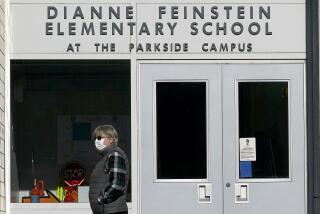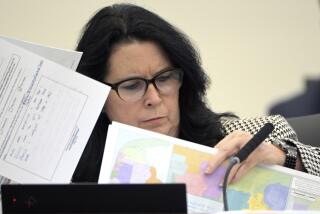Court Voids Part of Chicago Schools Plan : Education: Reform act gave parents more say in running the system. State justices rule the law violates principles of one person, one vote.
- Share via
CHICAGO — The Illinois state Supreme Court on Friday declared unconstitutional a part of a state law that made sweeping reforms in Chicago’s public schools.
The court ruled that the process for electing the local school councils at the heart of the plan violates the constitutional principle of “one person, one vote” by giving parents more power than other voters.
The School Reform Act, enacted in 1988, was intended to revitalize Chicago’s schools by decentralizing a top-heavy bureaucracy and giving parents more say in the education of their children.
The court said that if petitioned, it would give the city sufficient time to change the way school council members are elected.
The high court’s ruling was welcomed by principals, who in a lawsuit had challenged the act not only on the basis of “one person, one vote,” but also on grounds that it unfairly ended tenure for principals.
It “seemed to lay the blame for problems in Chicago schools on the shoulders of the principals,” said Bruce Berndt, president of the Chicago Principals Assn.
But the court said the act’s provision eliminating tenure for principals was constitutional, and supporters of the act said they believe the law can be fine-tuned to meet the court’s objections.
“Chicago school reform will remain intact and move forward,” said state Sen. Arthur Berman, a sponsor of the act. “We can broaden the election participation, and that would cure the fault the Supreme Court finds.”
State Senate President Philip Rock said lawmakers would take up the issue in the spring, after consulting with Chicago municipal and school leaders.
The act was aimed at curtailing dropouts and poor test scores that led then-federal Education Secretary William J. Bennett to call Chicago’s schools the nation’s worst. Chicago has the nation’s third-largest school district.
The school councils were comprised of six parents of children at the school, two community residents who did not have children at the school, two teachers and the school’s principal.
Under the law, parents were elected solely by fellow parents and community representatives were elected by the public at large--a process the court said was unconstitutional.
Justice William G. Clark was the only one of the court’s seven justices to dissent.
More to Read
Sign up for Essential California
The most important California stories and recommendations in your inbox every morning.
You may occasionally receive promotional content from the Los Angeles Times.













